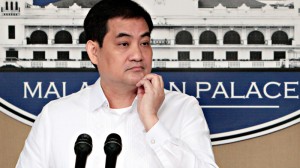
Presidential spokesman Edwin Lacierda: The DAP is good but all those who implemented it are criminally liable? INQUIRER FILE PHOTO
MANILA, Philippines–Malacañang on Thursday went on the offensive, assailing what it called “dissonance” in the Supreme Court decision, which purportedly imputed criminal liability to “good men and women” of the Cabinet in connection with the Disbursement Acceleration Program (DAP).
The Palace was wondering why the high court, in the decision, recognized the contributions of the stimulus program to the economy. In the ruling, the tribunal said the program “yielded undeniably positive results that enhanced the economic welfare of the country.”
Upright persons
Presidential spokesman Edwin Lacierda said the ruling extended “criminal liability” not only to Budget Secretary Florencio Abad, architect of the fund-consolidation scheme, but also to the likes of Public Works Secretary Rogelio Singson and Education Secretary Armin Luistro.
That’s because these Cabinet secretaries implemented projects funded by DAP money, which was disbursed by the Department of Budget and Management, Lacierda added.
“That is the import of the Supreme Court decision,” he said.
“Who implemented [the projects]? An upright person like Babes Singson, an upright person like Bro. Armin Luistro. Now they’re the ones being called ‘criminally liable.’ They’re the ones that you will now charge.”
Lacierda said these officials were “advancing the cause of reform” yet were the ones now being presumed to be “criminally liable.” “Is that a fair statement?” he asked.
“That’s why there is a certain sense of dissonance there, [a] disconnect on the decision,” Lacierda said at a press briefing.
“How come the Supreme Court has that kind of statement? The DAP is good but all those who implemented [it] are criminally liable. The decision should be studied properly on how it would affect our good people who implemented good projects,” Lacierda said.
Good faith
While it declared practices under the DAP unconstitutional, the high tribunal cited the doctrine of operative fact for projects “that can no longer be undone and whose beneficiaries relied in good faith on the validity [of the DAP].”
But the same doctrine “cannot apply to the authors, proponents and implementers of the DAP, unless there are concrete findings of good faith in their favor by the proper tribunals determining their criminal, civil, administrative and other liabilities,” it added.
“That’s why we respectfully disagree with the Supreme Court,” Lacierda said. “You may declare certain acts unconstitutional but to declare an operative fact doctrine, extending it beyond saying that it is unconstitutional and saying that we now have criminal liability, that is not something that is part of an effect of an operative fact doctrine.”
No leak from Palace
Until Thursday, Malacañang had not released a full accounting of all DAP-funded projects. But one report surfaced alleging that P25 million in DAP funds had been allocated to Bayan Muna Rep. Neri Colmenares, a fierce critic of the facility.
Lacierda insisted that the report, which was based on documents obtained by the Inquirer, was not leaked by Malacañang.
“Don’t take it personally,” he said, addressing Colmenares. “It didn’t come from us. I don’t know where that information came from.”
Lacierda also rejected the idea that the P25-million DAP fund was a reward to Colmenares for his role as a prosecutor in the impeachment trial of then Chief Justice Renato Corona in 2012.
“No, definitely not,” he said flatly.
“I think you should ask Neri and I think he would feel insulted if you say that to him. We may have political differences but I know Neri Colmenares as a person. He’s a man of principle. We do have political differences but I don’t think, if you ask him, he will agree to that statement.”